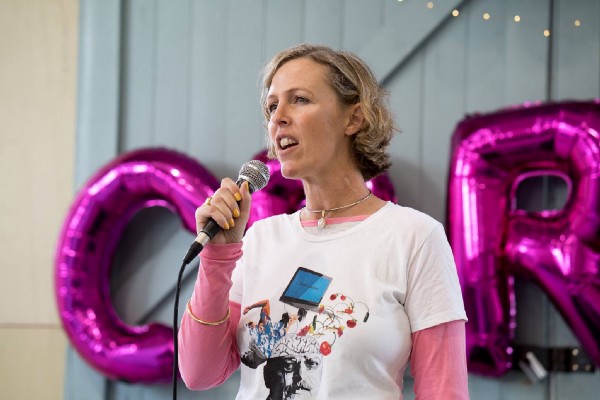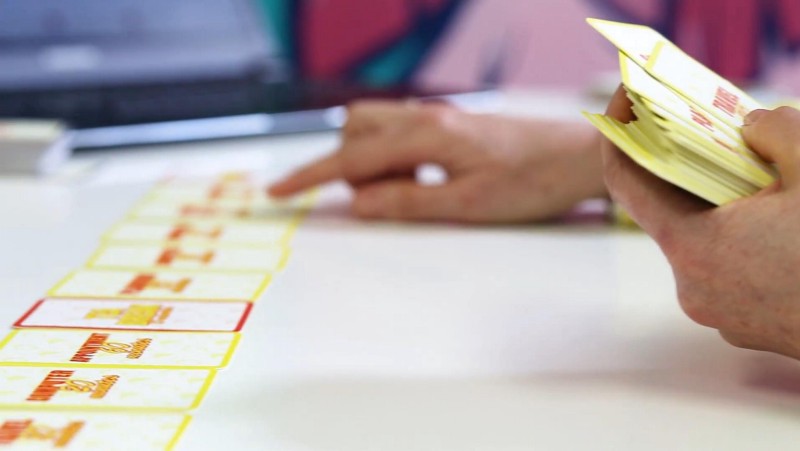After 10 years of chronic pain, Tina McIntosh wanted to find something that worked. Inspired by research on retraining the brain to no longer feel chronic pain, Tina developed a card game and app-based tool, Brain Changer. We had a talk with Tina about how her own experiences empowered her to bring this innovation into the world.

What is your health innovation? What does it aim to do?
Brain Changer is a card-based brain retraining game for people with chronic pain. It’s a daily pacing tool that helps people in pain gradually return to the activities they care about and live well again. Hidden inside a fun game is the many repetitions of tasks and ideas that help people with pain to re-wire their brains and change their symptoms. Brain Changer puts the concepts of therapeutic pain education in the palm of your hand, so you can take them anywhere you go.
How do you celebrate and showcase your successes? Who is the first person you tell?
The first person I call is my Co-founder, Aneal Chandra. He’s always thinking about how we can serve our customers better. Debriefing with him after a success or a set back invariably becomes a brainstorming session. It’s really exciting! I also capture moments of joy in our Brain Changer App — they’re what we call Halos! And setbacks or negatives are what we call Zombies. The aim of the game is to outweigh the darkness with light.
What challenges have you come up against in developing your health innovation? What motivated you to keep going?
The biggest challenge I’ve faced has been time. In the start-up phase, there’s a massive amount of work to do and usually a few people to do it. Brain Changer has been four years in the making and I’ve only just put a team together in the last year. Before that, I was doing it all myself. I’ve managed by using Brain Changer to pace myself each day, which forces me to be realistic about my time and truly focus as well reminding me to do the good stuff, like stopping for lunch and exercising. I’ve also hired passionate, talented people with different skill sets to me and I check in with my mentors regularly.
The other time crunch for me is that I’m a mum and a wife. My beautiful family needs me too and I’m acutely conscious that I’d be a big, fat hypocrite if I didn’t savour my time with them. I’m no superwoman though — we spend lots of time cooking and chatting together, but the house is pretty messy and we have many a cobweb.

What is one thing the public could do to help your innovation to succeed?
I implore people not to settle for a life of chronic pain! I had been living with chronic bilateral arm pain for 10 years in September 2014 when I stumbled across the work of Australian pain scientist Professor Lorimer Moseley. He’d discovered that you can re-train your brain so it doesn’t send chronic pain even if you’ve had chronic pain for a long time. I immediately set about getting my hands on everything Professor Moseley had written and listened to all his talks and interviews that I could find online. While I could understand the theory, I wasn’t clear about how to put it into practice in my daily life. So I’ve spent the last few years figuring this out!
When I gave Professor Mosely a demo in February 2017 he commented that it’s the first time he’s seen all the elements of pain science brought together in one tool. He is now my research partner.
Since February 2017 I have been working with clinicians to get the tool out to chronic pain sufferers. The results so far have been very promising — they suggest that the tool puts pain theory into practice correctly. Our users are reporting less pain, less medication and some now have regular time pain-free.
I had my own personal breakthrough in October 2016 when I worked my first pain-free, 8 hr computer day in 12 yrs. My tool wasn’t the sole reason for this recovery; I also took medication, visited my physiotherapist and GP regularly, exercised, and meditated most days. I had tried each of these strategies over the many years I’d had chronic pain but they only became effective when I added in a daily program of applied pain theory. So I think my tool could be the missing piece of the chronic pain rehab puzzle. The GPs, pain psychologists, and physios I’ve shown it too think so too.
What are the benefits of developing your innovation in Australia?
We have some of the best pain scientists in the world and we’ve been able to partner with them! Australia also has a really strong innovation community and one of the best things I’ve done is to connect with the Canberra Innovation Network (CBRIN). They regularly hold workshops for start-ups that are priced for bootstrapping it as well as free networking events.
Brain Changer is currently working with clinicians to get the program out to chronic pain suffers. To keep up to date with Brain Changers progress follow it on Health Horizon.
